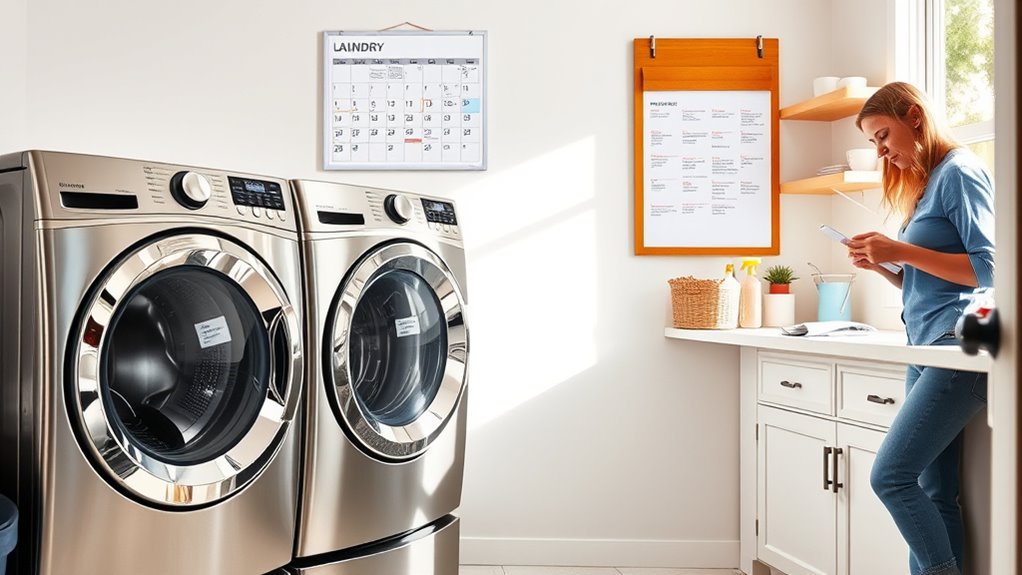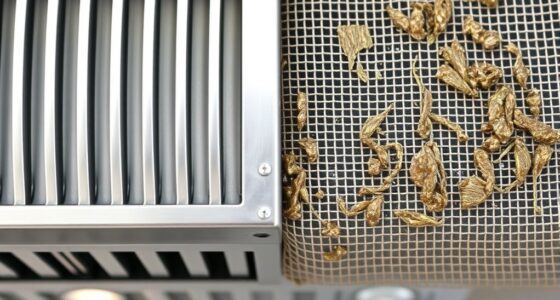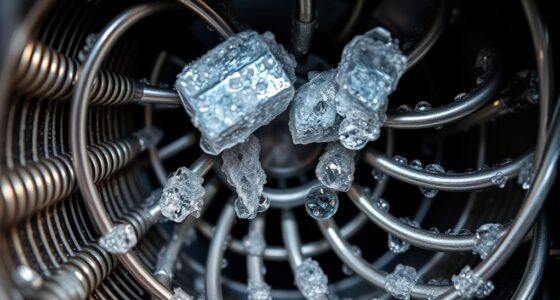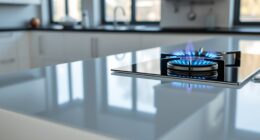Creating a regular maintenance schedule helps your appliances run efficiently and last longer. You should inspect and clean filters, vents, and coils every few months, and replace worn-out parts promptly. Schedule annual professional checkups for major appliances like your HVAC system. Keeping to this routine prevents breakdowns, saves energy, and cuts costs over time. Staying consistent with these tasks guarantees your home appliances stay in top shape—if you keep going, you’ll discover even more ways to improve their performance.
Key Takeaways
- Develop a monthly checklist for cleaning filters, vents, and inspecting hoses or seals to prevent damage and improve efficiency.
- Schedule seasonal professional inspections for HVAC, refrigeration, and major appliances to ensure optimal performance.
- Replace or clean filters (air, water, appliance filters) every 1-3 months based on manufacturer guidelines.
- Perform quarterly tasks like cleaning dryer lint filters, checking for leaks, and inspecting appliance connections.
- Create a yearly maintenance plan to review appliance performance, update schedules, and address potential issues proactively.
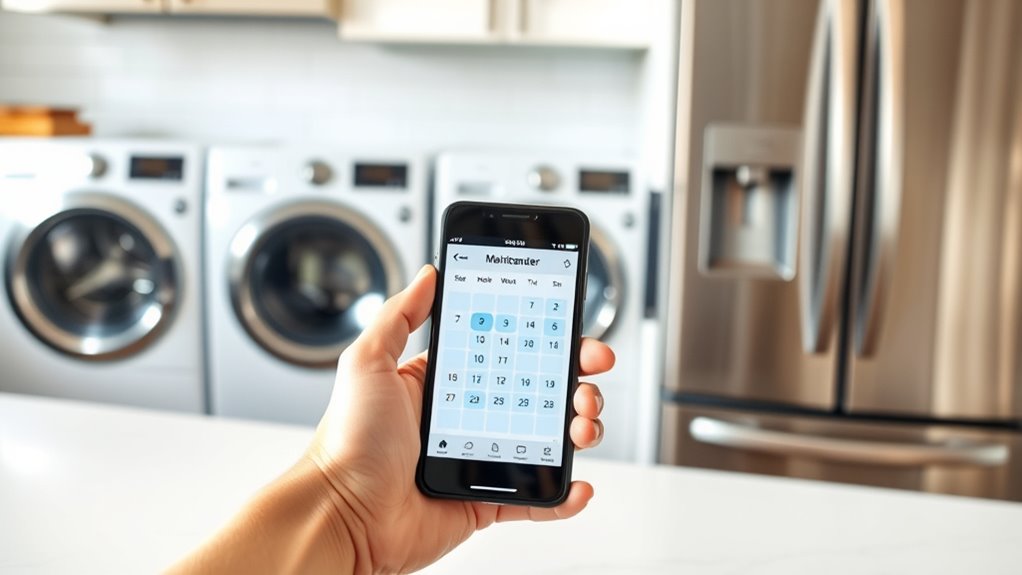
Maintaining your appliances on a regular schedule can extend their lifespan and prevent costly breakdowns. When you keep up with routine maintenance, you’re not only guaranteeing your appliances work smoothly but also improving their energy efficiency, which directly impacts your utility bills. Appliances that are well-maintained consume less energy, translating into noticeable cost savings over time. For example, a refrigerator with clean coils and a properly sealed door runs more efficiently, reducing electricity use and lowering your monthly expenses. Similarly, regular servicing of your HVAC system keeps it running at peak performance, ensuring comfort without wasting energy.
Regular appliance maintenance boosts efficiency, extends lifespan, and cuts utility costs.
By scheduling routine inspections and cleanings, you help catch small issues before they escalate into expensive repairs. For instance, cleaning dryer lint filters and vents prevents overheating and potential fires, but it also ensures your dryer operates more efficiently. When appliances work efficiently, they use less power, which is a critical factor in managing household costs. Maintaining your appliances also means replacing worn-out parts promptly, which helps avoid sudden breakdowns that might leave you scrambling for emergency repairs. This proactive approach not only prolongs the life of your appliances but also keeps your energy bills in check, as well-maintained units operate at ideal levels.
Creating a maintenance schedule doesn’t have to be complicated. Simple tasks like changing filters in your refrigerator, washing machine, or HVAC system every few months can greatly enhance performance. Regularly inspecting hoses, seals, and connections for leaks or damage also ensures that your appliances function properly and don’t waste energy. When you stay on top of these small chores, you’re actively contributing to your home’s overall energy efficiency and reducing unnecessary energy consumption. Over time, these small efforts add up to substantial cost savings, especially when you consider the expense of replacing appliances prematurely due to neglect.
Furthermore, taking the time to familiarize yourself with your appliances’ user manuals can help you understand specific maintenance needs. Many modern appliances have self-diagnostic features or alert systems that notify you when maintenance is required, making it easier to stay on schedule. Investing in professional inspections periodically can also be beneficial, as technicians can identify issues that might be invisible to the untrained eye. Regular maintenance of critical components like filters and air quality systems can significantly improve indoor air quality and appliance efficiency. By combining routine DIY tasks with professional checkups, you maximize the lifespan of your appliances and keep your energy costs manageable. Ultimately, maintaining a regular appliance maintenance schedule is a wise, cost-effective strategy that benefits your household both financially and in terms of efficiency.
Frequently Asked Questions
How Do I Reset My Appliance After Maintenance?
To reset your appliance after maintenance, first follow the specific reset procedures found in your user manual, which often involve unplugging the appliance for a few minutes. Then, plug it back in and turn it on. If it doesn’t reset, use troubleshooting tips like checking power connections or resetting circuit breakers. This guarantees your appliance functions properly and confirms the maintenance was successful.
Are There Any Signs My Appliance Needs Immediate Repair?
Think of your appliance as a trusted friend; if they start acting out of character, it’s time to pay attention. Appliance warning signs like strange noises, leaks, or sudden stops are urgent repair indicators you shouldn’t ignore. If your appliance is overheating, smelling burnt, or not responding, these are clear signals you need to call a professional. Addressing these signs promptly keeps your home running smoothly and prevents costly damage.
Can I Perform Maintenance Tasks Myself or Should I Hire a Professional?
You can often perform DIY tips for basic appliance maintenance, like cleaning filters or checking vents, but for complex tasks or if you’re unsure, it’s best to hire professional services. Doing simple maintenance yourself saves money and time, but professional technicians ensure thorough repairs and prevent potential damage. Always assess your skill level and comfort first—when in doubt, consulting a pro is the safest choice to keep your appliances running smoothly.
What Are the Safety Precautions Before Starting Maintenance?
Think of maintenance as steering a ship’s deck—you need to guarantee safety first. Before starting, unplug appliances to prevent electrical safety hazards, like stopping a storm before it hits. Wear gloves and safety glasses, and check your tools for proper function. Keep a fire extinguisher nearby and avoid working in wet conditions. By following these precautions, you steer clear of accidents and keep your home safe during maintenance.
How Do I Find Genuine Replacement Parts for My Appliances?
To find genuine replacement parts for your appliances, start by sourcing suppliers directly from the manufacturer’s website or authorized dealers. Avoid third-party sellers who may offer counterfeit parts. Check for official labels, model numbers, and warranty information to verify authenticity. You can also contact customer service for recommendations on trusted suppliers. Using genuine parts guarantees your appliance’s safety, performance, and longevity.
Conclusion
By sticking to this maintenance schedule, you’re the captain steering your household’s ship through calm waters and stormy seas alike. Regular check-ups keep your appliances humming smoothly, preventing unexpected breakdowns that could hit like rogue waves. Think of it as tending a garden—you plant the seeds of routine care today, and tomorrow, you’ll enjoy a flourishing, worry-free home. Keep this rhythm, and your appliances will serve you faithfully, like loyal companions on your daily journey.
